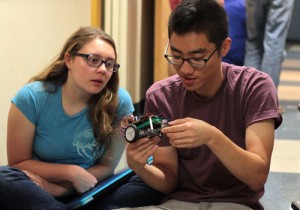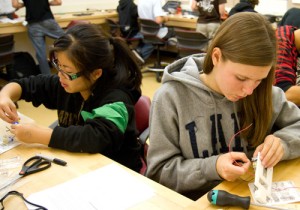Gordon Prize
Harvey Mudd College Faculty Members Share Prestigious 2012 Bernard M. Gordon Prize
College’s Innovative Clinic Program and Leadership Development Cited by NAE
The nation’s most prestigious engineering education award has been awarded to three Harvey Mudd College professors for their innovations in undergraduate engineering education.
The National Academy of Engineering announced Jan. 5 that Clive L. Dym, M. Mack Gilkeson and J. Richard Phillips will receive the $500,000 Bernard M. Gordon Prize for Innovation in Engineering and Technology Education “For creating and disseminating innovations in undergraduate engineering design education to develop engineering leaders.” Half of each Gordon prize is granted to the recipient and the remainder is granted to the recipient’s institution to support the continued development, refinement and dissemination of the recognized innovation.
Professors Dym, Gilkeson and Phillips are innovators who have helped develop a highly successful, project-based engineering design curriculum that continues to be the centerpiece of engineering instruction at the College and a model for numerous other colleges and universities,” said President Maria Klawe. “Their work, and that of other members of the Department of Engineering, is what has made Harvey Mudd College’s engineering program one of the best in the nation for undergraduates.
“Mack, Rich and Clive have had an enormous impact on engineering education at Harvey Mudd, and the programs and curriculum advances they have led have found their way around the world,” said Professor Ziyad Duron, chair of the Department of Engineering. “They have contributed to an engineering program that has design, problem-solving, and professional practice woven throughout a student’s experience at Harvey Mudd. Mack along with the late Jack Alford were early advocates of a broad, flexible curriculum that emphasized experiential learning and communication skills and which led to the innovation of the engineering Clinic Program. Under Rich’s leadership, the Clinic program grew in relevance and became a model for project-based learning at the undergraduate level. Clive’s contributions to our design offerings formalized the instruction of a subject matter previously thought off-limits to 1st year students—a notion that Clive effectively laid to rest and – by doing so – has opened up new opportunities and pedagogies for engineering design education. Their contributions allow our program to stay focused on fundamentals, while tracking the ever changing practice of our profession and teaching our students how to think, frame, and solve problems. The Gordon prize recognizes the great contribution these three educational pioneers have made in creating a program with design education at its core, within the context of practice—one that ultimately is highly effective at educating the next generation of engineering leaders.”
The three professors are being honored for their contributions to Harvey Mudd’s engineering program, which combines hands-on, experience-based learning with formal design instruction in an approach aimed at creating engineering leaders. The curriculum includes a leadership strategy course in which students meet highly-successful businesspeople, the opportunity to teach K-12 students, and a strong emphasis on writing and presentations. The program continues to be innovative and has had a profound influence on activities at other institutions.
Clive L. Dym created the program’s formal design instruction and contributed to a hands-on studio component for the freshman projects class. Dym also advocated the integration of the design and making of tools and prototypes into that class. This helped students learn about manufacturing and design and how to communicate about their work. Dym is the driving force behind the Mudd Design Workshops, which bring together a wide range of institutions to discuss engineering education and their shared experiences. Dym is the Fletcher Jones Professor of Engineering Design and director of the Center for Design Education at Harvey Mudd College.

M. Mack Gilkeson is the co-inventor and co-founder of the Clinic program, a hands-on approach to teaching engineering in which small teams of students are given real-life design problems to solve from industry partners. The program was controversial at its outset because this approach defied conventional wisdom and went very much counter to the then-prevailing thinking about engineering curricula. Thus, while the Clinic program initially faced concerns, even some internally, Gilkeson and his colleagues proved it could work and it became a model for many other institutions. Gilkeson is professor of engineering emeritus at Harvey Mudd College.
J. Richard Phillips was the engineering Clinic director for 17 years and transitioned Clinic into a sustainable program that is now integral to the overall Harvey Mudd engineering curriculum. He also was directly involved in the establishment of Clinic programs in other colleges and universities. The program has now extended to other departments in the College, influencing fields outside of engineering as well. Phillips also was instrumental in the development of the Experimental Engineering Lab to give students a deeper and more intuitive grasp of concepts they learn in their theory classes. Phillips is professor of engineering emeritus at Harvey Mudd College.

The Gordon Prize was established in 2001 as a biennial prize recognizing new modalities and experiments in education that develop effective engineering leaders. Recognizing the potential to spur a revolution in engineering education, NAE announced in 2003 that the prize would be awarded annually. The prize is named after Bernard M. Gordon, considered the “father of analog to digital conversion” for his inventions and contributions to signal translation, medical tomography and other high-precision instrumentation. Gordon has more than 200 patents worldwide.
The Gordon Prize includes a $500,000 cash award—half granted to the recipient and the remainder granted to the recipient’s institution to support the continued development, refinement, and dissemination of the recognized innovation. Dym, Gilkeson and Phillips have generously redirected a portion of their half of the prize to the College.
The National Academy of Engineering is an independent, nonprofit institution. Its members consist of the nation’s premier engineers, who are elected by their peers for seminal contributions to engineering. The academy provides leadership and guidance to government on the application of engineering resources to social, economic, and security problems. Established in 1964, NAE operates under the congressional charter granted to the National Academy of Sciences in 1863.